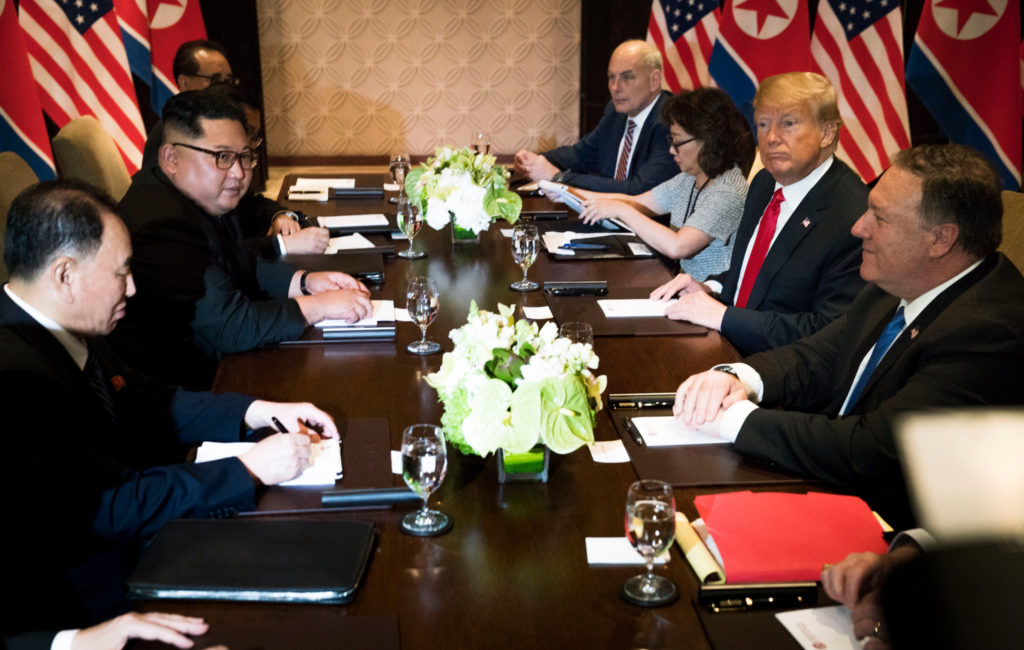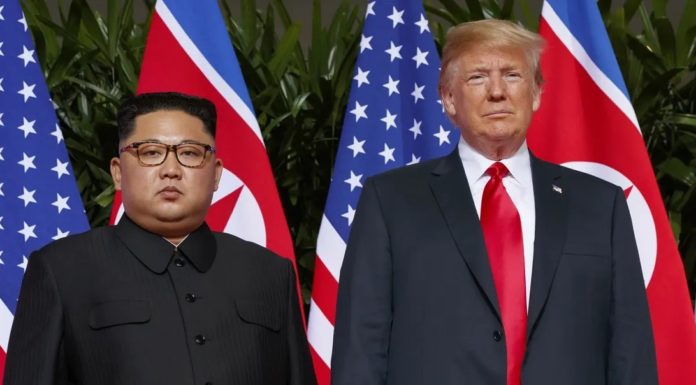Though President Donald Trump touted his meeting with Chairman Kim Jong Un as a historic move, most independent evaluations and interpretations do not support the presidential camp’s euphoria. Critics say that the summit has legitimised Kim whose regime has been accused of multiple human rights abuses, and that the summit was more about headlines than substantive progress. They also argue that many agreements made in the past with North Korea have later fallen apart.
It is interesting that after stampeding Iran nuclear deal only weeks ago President Trump found a willing state to ink a fresh but highly vague nuclear framework. True to his usual approach towards diplomacy, Trump has declared that North Korea is no longer a nuclear threat. North Korean media has since switched over to a jubilant mode, calling it a great victory, claiming that North Korea had won major concessions as the US president had said: “the World has taken a big step back from potential Nuclear catastrophe! No more rocket launches, nuclear testing or research! The hostages are back home with their families. Thank you to Chairman Kim, our day together was historic!” Trump had twittered.
North Korea’s media reported that President Trump had not only promised to end joint military drills with South Korea but also to lift sanctions and allow a “step-by-step” denuclearization process, rather than the immediate dismantling of its nuclear programme. Secretary of State Mike Pompeo is of the view that North Korea will get no economic sanctions relief until it completes denuclearization, dismissing claims from Pyongyang that the US had offered to drop some sanctions during the process.
A classified assessment from Israel’s foreign ministry has raised a point that a brief document signed by Trump and Kim fails to commit the North to “full, verifiable, irreversible denuclearization.“ Instead, the agreement calls for “complete denuclearization.” The report also questions Trump’s decision to suspend joint military drills with South Korea, “the road to real and substantive change, if it ever happens, will be long and slow.” Retired Admiral Harry Harris, the US ambassador designate to South Korea has challenged Trump’s claim that North Korea no longer poses a nuclear threat to the world, saying that “we have to continue to worry about that.”
Secretary Pompeo stated that the agreement commits North Korea to total nuclear disarmament as demanded by the US. The announcement marked a reversal from the past American rejection of China’s “freeze-for-freeze” proposal, which called for an end to the military exercises in exchange for a cease to the North’s weapons tests. The Secretary was of the view that North Korea will get no economic sanctions relief until it completes denuclearization; dismissing claims from Pyongyang that the US had offered to drop some sanctions during the process.
Analysts have pointed to the lack of substance in the agreement that has committed the US to unspecified security guarantees for North Korea in exchange for denuclearization of the Korean Peninsula. Many have said that though Pyongyang had vowed in the past to denuclearize but had repeatedly broken such promises.
Carnegie has reported: “The Singapore summit was Pyongyang’s moment to come out as the world’s ninth nuclear power. Despite North Korea’s vague commitment to denuclearization, the only thing that may be dismantled is the United States’ long-standing military alliance with Japan and South Korea. And with the United States pulling back, China moves closer to being the dominant regional power”. Pyongyang has reason to feel confident after the meeting, the heavily sanctioned regime had long been craving for international legitimacy. “Kim Jong Un got what he wanted: the international prestige and respect of a one-on-one meeting with the American president, the legitimacy of North Korean flags hanging next to American flags in the background,” said Paul Haenle, director of the Carnegie-Tsinghua Centre.
Trump made the surprise announcement that the US would halt joint military exercises with its security ally Seoul, something long sought by Pyongyang, which claims the drills are a rehearsal for invasion. The US stations around 30,000 troops in security ally, South Korea to protect it from its neighbour, North Korea, which invaded it in 1950 in an attempt to reunify the Korean peninsula by force. “We will be stopping the war games which will save us a tremendous amount of money,” Trump told reporters, adding that “at some point” he wanted to withdraw US troops from the South. Both Seoul and US military commanders in the South indicated they had no idea the announcement was coming, and in an editorial Korea Herald said it was “worrisome”.
In a joint statement, Kim agreed to the “complete denuclearisation of the Korean Peninsula”, a phrase favoured by Pyongyang that stopped short of long-standing US demands for North Korea to give up its atomic arsenal in a “verifiable” and “irreversible” way. Trump “expressed his intention” to lift sanctions against the North “when we are sure that the nukes are no longer a factor”. The sanctions right now remain.”
World powers have welcomed its outcome, though with a proviso that it was only the first step towards resolving the nuclear stand-off. Some media in Japan were cautious: “The real bargaining has now started between the US and North Korea. Problems that cannot be solved through a bling-bling political show remain on both sides,” said the liberal paper Mainichi Shimbun. Reactions from America’s allies in Asia have been mixed. Some question whether Trump’s outreach to the North actually signalled a broader American retreat from the region.
On paper there is nothing President Trump could extract from North Korean leader, that Kim’s father and grandfather had not already given to past American presidents. In fact, he got less, at least for now. Trump is betting everything on the “terrific relationship” and “very special bond” that he said he developed with Kim. Just days before the meeting they were exchanging barbs. Trump has brushed aside suggestions that the phrase “complete denuclearization of the Korean Peninsula” means something different in Pyongyang than it does in Washington.

During a freewheeling news conference, President Trump argued that their rapport would bring the swift demise of that country’s nuclear programme. Secretary of State Mike Pompeo said a day later that North Korea should take major steps to get rid of its nuclear arsenal within the next two years. Pompeo said he wouldn’t disclose a specific timeline but noted the Trump administration is hopeful that “major, major disarmament” steps will happen before Trump’s first term ends in January 2021, the Associated Press reported.
Speaking to reporters in South Korea, Pompeo also said Kim understands that “there will be in-depth verification” of nuclear commitments. Pompeo shrugged off the concerns about the word “verifiable” not being included in the agreement and said it refers to “complete” disarmament, which “in the minds of everyone concerned” means “verifiable.” Addressing Trump’s surprise announcement during a news conference after the summit that he would suspend joint military exercises with South Korea while talks are under way, Pompeo said the operations will resume if Pyongyang fails to negotiate in good faith. He said Trump “made very clear” to Kim that the halt was contingent on good-faith talks proceeding. If the US decides they aren’t, the freeze “will no longer be in effect.”
The joint statement was sketchy. Though it called for the “complete denuclearization” of the Korean Peninsula but provided neither a timeline nor any details about how the North would go about giving up its weapons. In past arms agreements, American governments have routinely insisted that international inspectors be able to rigorously verify compliance. That was the case with the 2015 Iran nuclear deal, which imposed unprecedented 24/7 monitoring on Iran’s activities and which Trump has reneged on account of inadequacy. It also contained no definition of “denuclearization” which the United States and North Korea interpret differently.
James Acton has aptly argued in Huffington Post: “The Trump-Kim summit and particularly its aftermath was a farce. While it doesn’t need to be this way, the president’s bombastic all-or-nothing approach to denuclearizing North Korea means that, by the end of this process, we could easily be closer to a war than when we began. If there is a way out of this mess, it must involve the United States adopting realistic goals”.
In a joint paper for Carnegie, Toby Dalton, Narushige Michishita, and Tong Zhao have opined: “The summit between Donald Trump and Kim Jong-un holds out a vague promise of progress toward denuclearizing North Korea. In the meantime, the United States and South Korea are likely to continue strengthening capabilities to deter North Korean coercive behaviour. Yet, as they do this, it will become increasingly important to assess the regional implications of their actions. Their efforts have already had, and will continue to have, broad spill over effects, potentially creating new tensions with China and complicating alliance relations with Japan. All of the prospective deterrence options could fuel misperception and lead to further instability in the region”.
Kim had made great gestures prior to summit, dismantling of nuclear testing site, removal of three top military generals and freeing American hostages alongside a promise of a moratorium on missile testing as well. On the other hand, Trump played hard, he even walked away from the summit; he reverse paddled after receiving a “big” letter from Kim.
Did Kim play blind or he has had credible assurances through back channels? While analysts were hoping that after the Iran nuclear deal fiasco, it would be Kim walking away from the summit citing credibility issue with Trump. But he was seen dying for the summit, this eagerness has surprised many. Have long biting sanctions sapped Kim’s will to resist, or there is an undercover understanding on the issue between China and the US on the final outcome of settlement? One has to only wait and see. A long march toward uncertainty has
just begun!





